Behind closed doors, President Donald Trump has made his views on Ukraine clear: "They tried to take me down."
The president, according to people familiar with testimony in the House impeachment investigation, sees the Eastern European ally, not Russia, as responsible for the interference in the 2016 election that was investigated by special counsel Robert Mueller.
It's a view denied by the intelligence community, at odds with U.S. foreign policy and dismissed by many of Trump's fellow Republicans. But Trump's belief suggests the extent to which his approach to Ukraine -- including his request, now central to impeachment, that the Ukraine president do him a "favor" and investigate Democrats — was colored by a long-running, unproven conspiracy theory that has circulated online and in some corners of conservative media.

President Donald Trump, center, points to members of his Cabinet while speaking during a Cabinet meeting in the Cabinet Room of the White House, Monday, Oct. 21, 2019, in Washington, as Health and Human Services Secretary Alex Azar, left, and Secretary of State Mike Pompeo, right, listen. (AP PhotoPablo Martinez Monsivais)
On Monday, Trump derided the impeachment probe anew as a "witch hunt," insisting that he did nothing wrong in his phone call with Ukraine President Volodymyr Zelenskiy.
But those testifying in the impeachment inquiry, now entering its fifth week, are recalling that Trump's views on Ukraine were seen as a problem by some in the administration.
Some of those testifying recalled a May meeting at the White House when U.S. officials, just back from attending Zelenskiy's inauguration in Kyiv, briefed Trump.
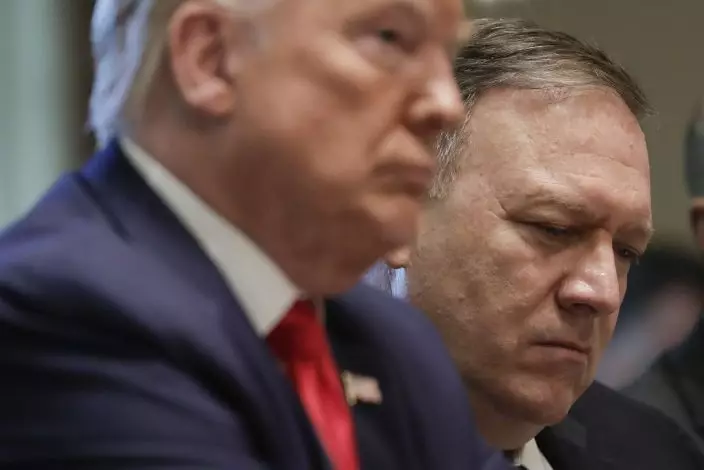
Secretary of State Mike Pompeo, right and President Donald Trump, left, listen during a Cabinet meeting in the Cabinet Room of the White House, Monday, Oct. 21, 2019, in Washington. (AP PhotoPablo Martinez Monsivais)
Ambassador to the European Union Gordan Sondland, special envoy Kurt Volker and other witnesses have described Trump as suspicious of Ukraine despite well-established American support for the fledgling democracy there. That's according to publicly released transcripts, as well as people familiar with the private testimony to impeachment investigators. They were granted anonymity to discuss it.
Several witnesses have testified that Trump believed Ukraine wanted to destroy his presidency.
"President Trump was skeptical," Sondland testified, according to his written remarks. Sondland said that only later did he understand that Trump, by connecting the Ukrainians with his personal lawyer, Rudy Giuliani, was interested in probing the 2016 election as well as the family of his potential 2020 rival, Joe Biden.
"It was apparent to all of us that the key to changing President Trump's mind on Ukraine was Mr. Giuliani."
House Democrats launched the impeachment inquiry after a whistleblower filed a complaint that included Trump's July call with Zelenskiy. The call was placed the day after Mueller testified to Congress and brought an end to the two-year Trump-Russia probe.
"Our country has been through a lot and Ukraine knows a lot about it," Trump told Zelenskiy, according to a rough transcript of the call released by the White House.
"I would like you to find out what happened with this whole situation with Ukraine, they say CrowdStrike," Trump said. "The server, they say Ukraine has it."
Trump was airing the conspiracy-theory view, shared by Giuliani, that the security firm CrowdStrike, which was hired by the Democratic National Committee to investigate the 2016 hack of its email, may have had ties to Ukraine.
CrowdStrike determined in June 2016 that Russian agents had broken into the committee's network and stolen emails that were subsequently published by WikiLeaks. The firm's findings were confirmed by FBI investigators and helped lead to Mueller's indictments of 12 individuals from Russia's military intelligence agency.
But the loose conspiracy theory contends that the DNC email hack was a set-up, bolstered by fake computer records, designed to cast blame on Russia. Even the president's Republican allies have tried to dissuade Trump from it.
"I've never been a CrowdStrike fan; I mean this whole thing of a server," said Republican Rep. Mark Meadows of North Carolina last week.
Meadows, a confidant of Trump, said he's sure Ukraine had some role in the U.S. election. But he views the search for the email server as farfetched. "I would not on my dime, send a private attorney looking for some server in a foreign country," Meadows told reporters.
Perhaps contributing to the conspiracy theories surrounding CrowdStrike and the DNC is the fact that the FBI never took possession of the actual computer server that would have held the hacked emails.
Instead, the FBI relied on the forensics provided by CrowdStrike.
The FBI had "repeatedly stressed" to the DNC its desire to have access to servers, former FBI Director James Comey testified at a March 2017 hearing before a House panel. But he acknowledged it is not unusual for the FBI to use such forensics in place of the actual hard drive during cyber investigations.
Other Republicans have also tried to convince Trump it was not Ukraine that was involved.
Trump's former homeland security adviser, Tom Bossert, said Giuliani had done Trump a disservice by pushing the false story.
"I am deeply frustrated with what he and the legal team is doing and repeating that debunked theory to the president," Bossert said in September on ABC. "It sticks in his mind when he hears it over and over again," said Bossert, who also was an adviser to President George W. Bush. "That conspiracy theory has got to go; they have to stop with that; it cannot continue to be repeated."
On the call, Trump went on to ask Zelenskiy to also look into Burisma, the Ukraine gas company with links to his 2020 presidential rival, Joe Biden's family. Biden's son, Hunter, served on the board when the former vice president was the Obama administration's main emissary to Ukraine.
Last week, Trump's acting chief of staff Mick Mulvaney acknowledged that Trump essentially engaged in a quid pro quo in seeking Zelenskiy's help in exchange for military aid the White House was withholding from Ukraine.
Mulvaney said the request was not improper because Trump wanted help with the 2016 investigation rather than looking ahead to 2020. It is against the law to seek or receive help of value from a foreign entity in U.S. elections.
Mulvaney later clarified his comments, saying, "The president never told me to withhold any money until the Ukrainians did anything related to the server."
Associated Press writer Eric Tucker in Washington contributed to this story.
KYIV, Ukraine (AP) — A big, new package of U.S. military aid will help Ukraine avoid defeat in its war with Russia. Winning will still be a long slog.
The arms and ammunition in the $61 billion military aid package should enable Ukraine to slow the Russian army's bloody advances and block its strikes on troops and civilians. And it will buy Ukraine time — for long-term planning about how to take back the fifth of the country now under Russian control.
“Ultimately it offers Ukraine the prospect of staying in the war this year,” said Michael Clarke, visiting professor in war studies at King’s College London. “Sometimes in warfare you’ve just got to stay in it. You’ve just got to avoid being rolled over.”
The U.S. House of Representatives approved the package on Saturday after months of delays by some Republicans wary of U.S. involvement overseas. It was passed by the Senate on Tuesday, and President Joe Bidensigned it into law on Wednesday.
The difference could be felt within days on the front line in eastern and southern Ukraine, where Russia’s much larger army has been slowly taking territory against massively outgunned Ukrainian forces.
The aid approval means Ukraine may be able to release artillery ammunition from dwindling stocks that it has been rationing. More equipment will come soon from American stocks in Poland and Germany, and later from the U.S.
The first shipments are expected to arrive by the beginning of next week, said Davyd Arakhamia, a lawmaker with Ukrainian President Volodymyr Zelenskyy’s Servant of the People party.
But opposition lawmaker Vadym Ivchenko, a member of the Ukrainian parliament’s National Security, Defense and Intelligence Committee, said logistical challenges and bureaucracy could delay shipments to Ukraine by two to three months, and it would be even longer before they reach the front line.
While details of the shipments are classified, Ukraine’s most urgent needs are artillery shells to stop Russian troops from advancing, and anti-aircraft missiles to protect people and infrastructure from missiles, drones and bombs.
What’s coming first is not always what front-line commanders need most, said Arakhamia, the Ukrainian lawmaker. He said that even a military giant like the U.S. does not have stockpiles of everything.
“The logic behind this first package was, you (the U.S.) finds our top priorities and then you see what you have in the warehouses,” Arakhamia said. “And sometimes they do not match.”
Hope for future breakthroughs for Ukraine still hangs on more timely deliveries of Western aid, lawmakers acknowledge.
Many experts believe that both Ukraine and Russia are exhausted by two years of war and won’t be able to mount a major offensive — one capable of making big strategic gains — until next year.
Still, Russia is pushing forward at several points along the 1,000-kilometer (600-mile) front, using tanks, wave after wave of infantry troops and satellite-guided gliding bombs to pummel Ukrainian forces. Russia is also hitting power plants and pounding Ukraine’s second-largest city, Kharkiv, which is only about 30 kilometers (some 20 miles) from the Russian border.
Ivchenko said the goal for Ukraine’s forces now is to “hold the line” until the bulk of new supplies arrive by mid-summer. Then, they can focus on trying to recapture territory recently lost in the Donetsk region.
“And probably ... at the end of summer we’ll see some movement, offensive movement of the Ukrainian armed forces,” he said.
Some military experts doubt Ukraine has the resources to mount even small offensives very soon.
The U.S. funding “can probably only help stabilize the Ukrainian position for this year and begin preparations for operations in 2025,” said Matthew Savill, director of military sciences at the Royal United Services Institute, a think tank.
In the best-case scenario for Ukraine, the American aid will give commanders time to reorganize and train its army — applying lessons learned from its failed summer 2023 offensive. It may also galvanize Ukraine’s allies in Europe to increase aid.
“So this just wasn’t about Ukraine and the United States, this really affected our entire 51-country coalition,” said U.S. Congressman Bill Keating, a Democrat who visited Kyiv on Monday as part of a four-member congressional delegation.
Zelenskyy insists Ukraine's war aim is to recapture all its territory from Russia — including Crimea, seized illegally in 2014. Even if the war ultimately ends through negotiation, as many experts believe, Ukraine wants to do that from as strong a position as possible.
Whatever happens on the battlefield, Ukraine still faces variables beyond its control.
Former U.S. President Donald Trump, who seeks to retake the White House in the November election, has said he would end the war within days of taking office. And the 27-nation Europe Union includes leaders like Hungarian Prime Minister Viktor Orbán and Slovak Prime Minister Robert Fico, who have opposed arming Ukraine.
Ukraine’s allies have held back from supplying some arms out of concern about escalation or depleting their own stocks. Ukraine says that to win the war it needs longer-range missiles it could use for potentially game-changing operations such as cutting off occupied Crimea, where's Russia's Black Sea fleet is based.
It wants a longer-range version of Army Tactical Missile Systems, known as ATACMs, from the U.S. and Taurus cruise missiles from Germany. Both governments have resisted calls to send them because they are capable of striking targets deep within Russian territory.
The new bill authorizes the president to send Ukraine the longer-range ATACMS, which have a range of some 300 kilometers (190 miles), “as soon as practicable.” It's unclear what that will mean in practice.
Sometimes, promised weapons have arrived late, or not at all. Zelenskyy recently pointed out that Ukraine is still waiting for the F-16 fighter jets it was promised a year ago.
Meanwhile, Russia is using its advantage in troops and weapons to push back Ukrainian forces, perhaps seeking to make maximum gains before Ukraine's new supplies arrive.
For weeks it has pummeled the small eastern city of Chasiv Yar, suffering heavy losses. Britain's Ministry of Defense says 900 Russian troops are being killed or injured a day in the war.
Capturing the strategically important hill town would allow them to move toward Sloviansk and Kramatorsk, key cities Ukraine controls in the eastern region of Donetsk. It would be a significant win for Russian President Vladimir Putin, who Western officials say is bent on toppling Ukraine’s pro-Western government.
Russian pressure was aimed not just at gaining territory, but on undermining Zelenskyy and bolstering critics who say his war plan is failing, said Clarke of King's College London.
The U.S. aid package decreases the likelihood of a political crisis in Ukraine, and U.S. Speaker Mike Johnson deserves credit for pushing it through Congress, he said.
"He held history in his hands,” Clarke said.
This story has been updated to correct Orbán's title, the Slovak prime minister's name and that the British estimate of daily Russian losses is for the war, not one battle.
Follow AP’s coverage of the war in Ukraine at https://apnews.com/hub/russia-ukraine
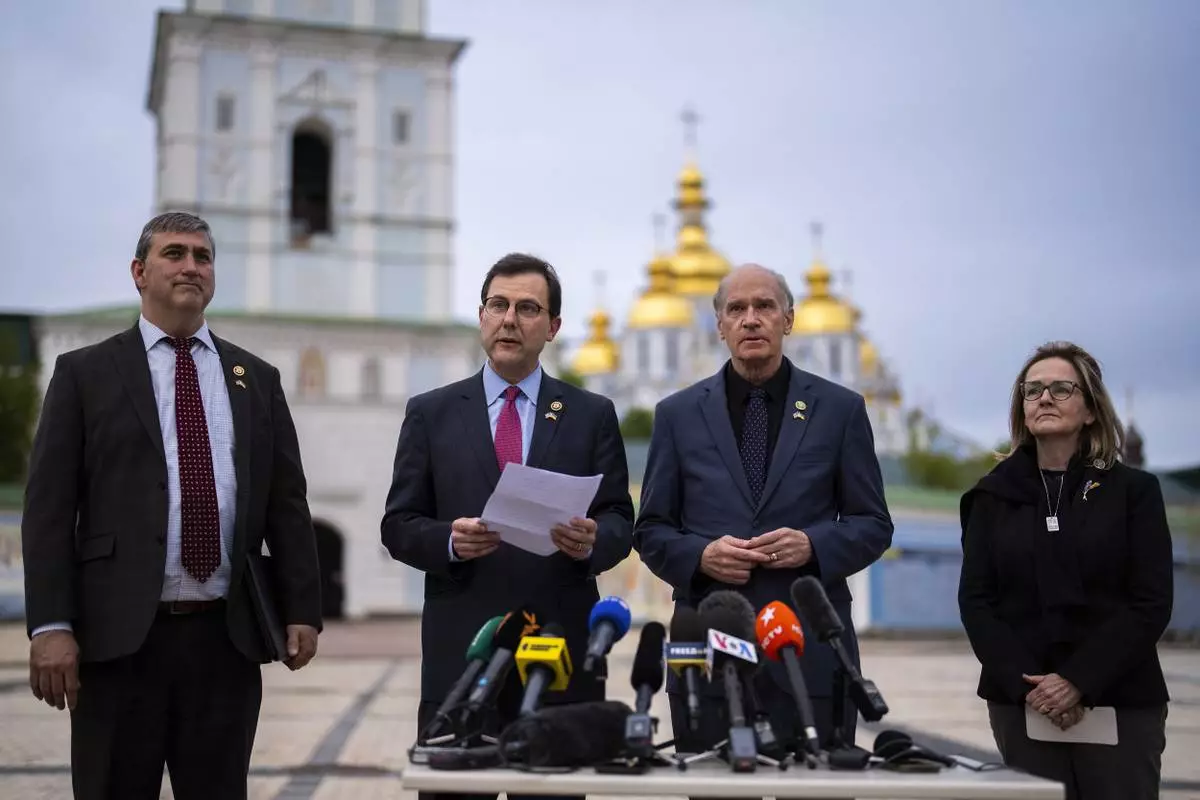
From left, U.S. representatives Nathaniel Moran, R-Tx, Tom Kean Jr, R-NJ, Bill Keating, D-Mass, and Madeleine Deane, D-Pa, talk to journalists during a joint news conference outside Saint Michael cathedral in Kyiv, Ukraine, Monday, April 22, 2024. A newly approved package of $61 billion in U.S. aid may prevent Ukraine from losing its war against Russia. But winning it will be a long slog. (AP Photo/Francisco Seco)
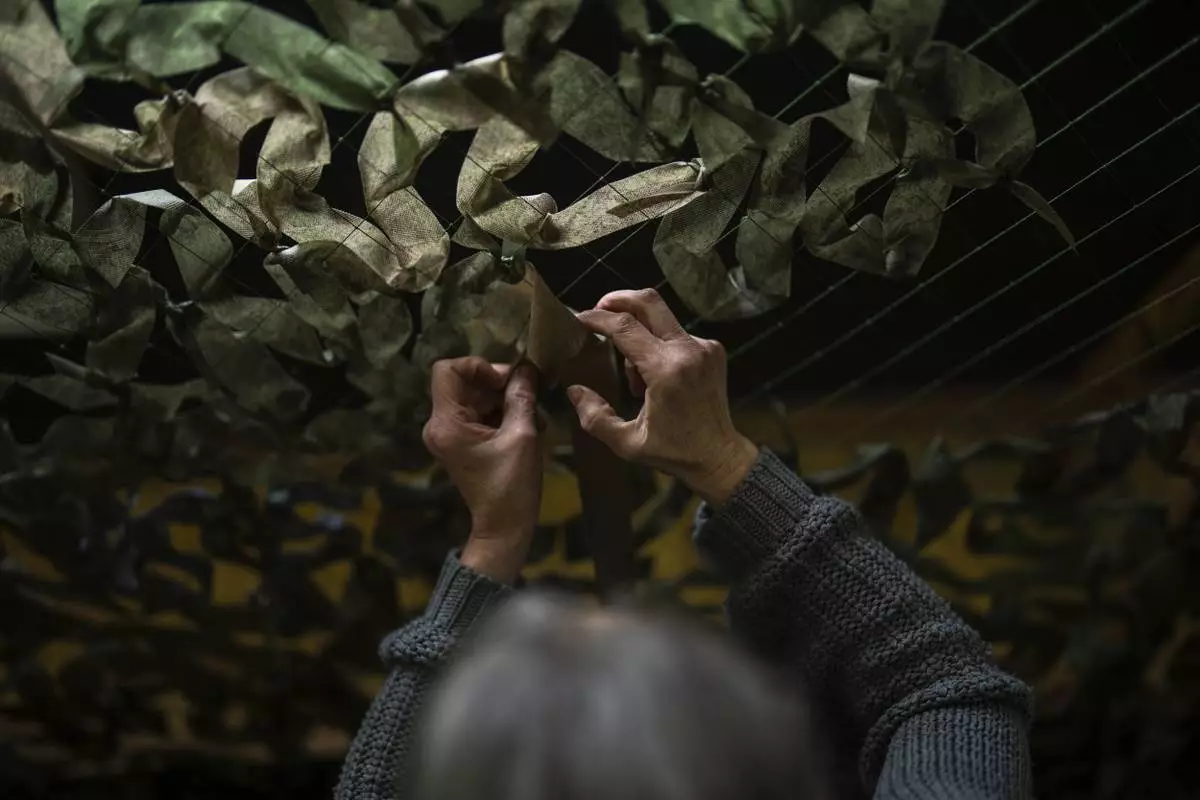
A volunteer makes a camouflage net at a facility producing material for Ukrainian soldiers in Kyiv, Ukraine, Monday, April 22, 2024. A newly approved package of $61 billion in U.S. aid may prevent Ukraine from losing its war against Russia. But winning it will be a long slog. (AP Photo/Francisco Seco)
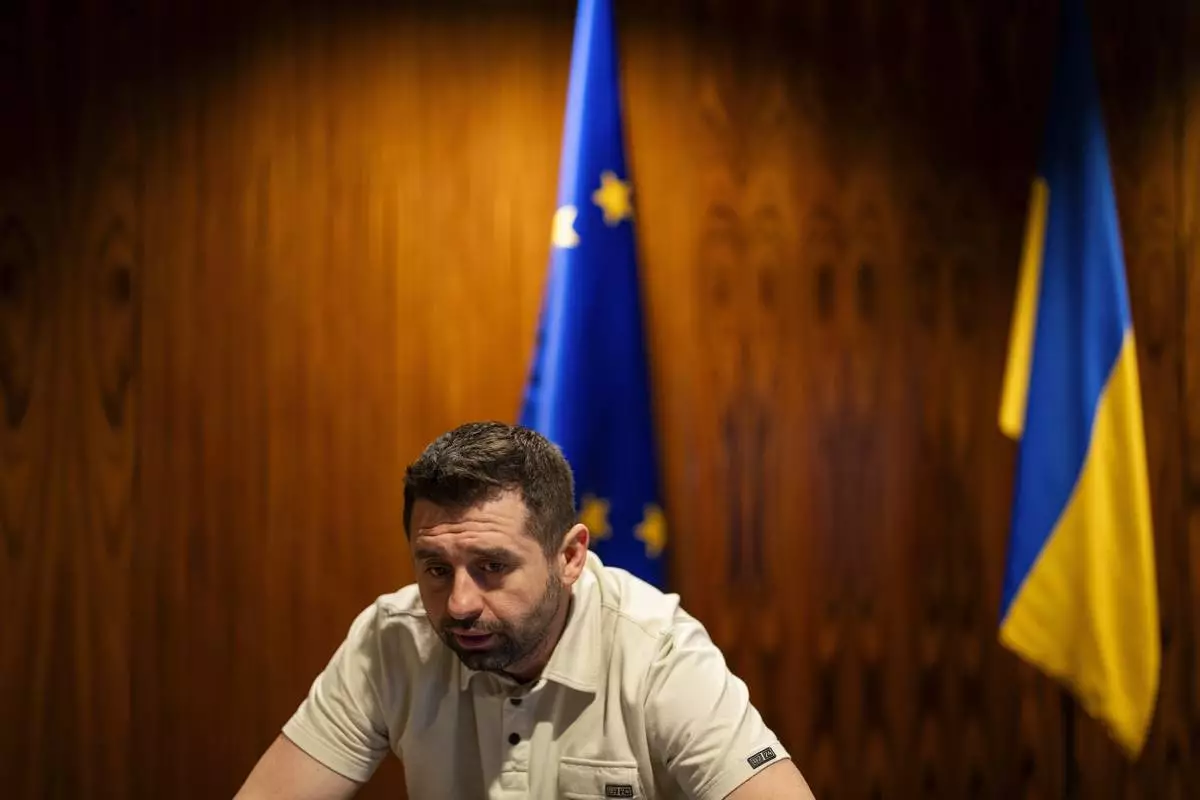
Davyd Arakhamia, a lawmaker with Ukrainian President Volodymyr Zelenskyy's Servant of the People party, talks during an interview with Associated Press in Kyiv, Ukraine, Monday, April 22, 2024. (AP Photo/Francisco Seco)
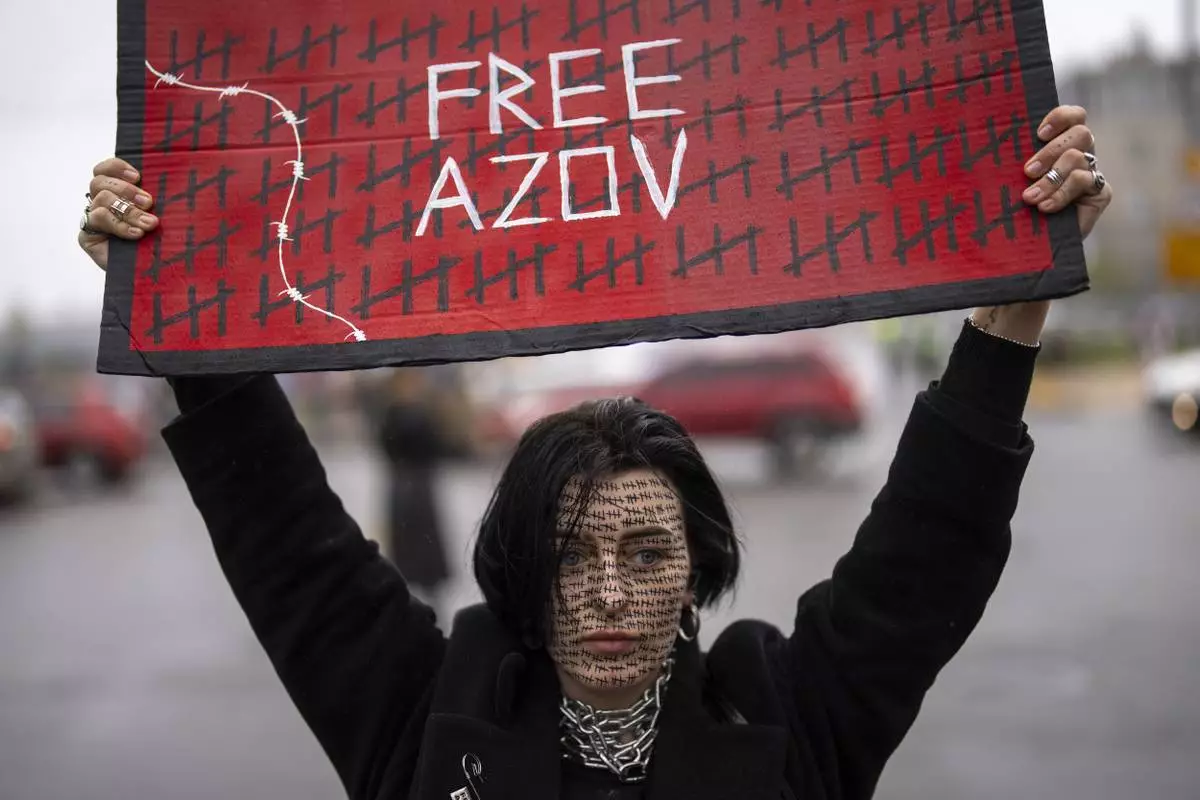
A woman rallies to raise awareness on the fate of Ukrainian prisoners of war in Kyiv, Ukraine, Sunday, April 21, 2024. (AP Photo/Francisco Seco)
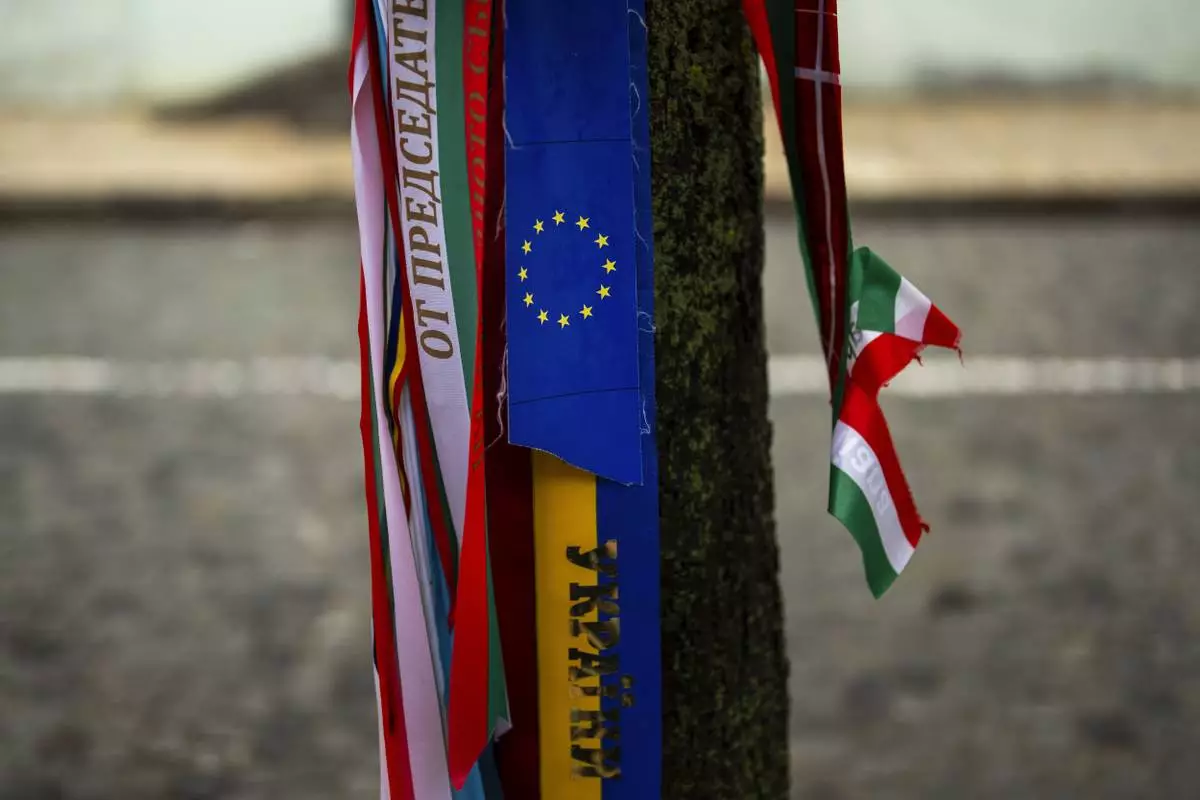
Ribbons with the colors of the European Union and Ukraine are attached to a tree next to memorial wall of Ukrainian soldiers killed during the war in Kyiv, Ukraine, Monday, April 22, 2024. (AP Photo/Francisco Seco)
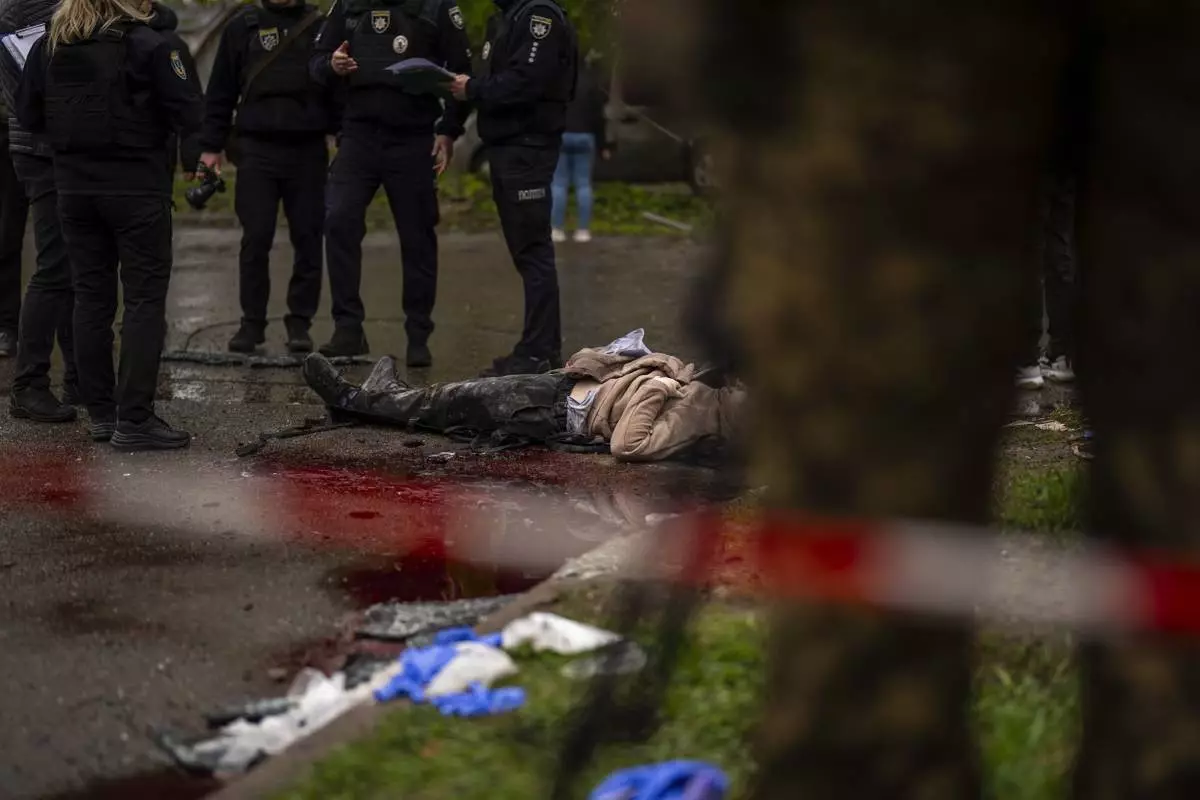
The body of a woman killed by Russian bombardment in Chernihiv, Ukraine, Wednesday, April 17, 2024. (AP Photo/Francisco Seco)

Soldiers carry the coffins of two Ukrainian army sergeants during their funeral in Lviv, Ukraine, Tuesday, April 16, 2024. (AP Photo/Francisco Seco)


















